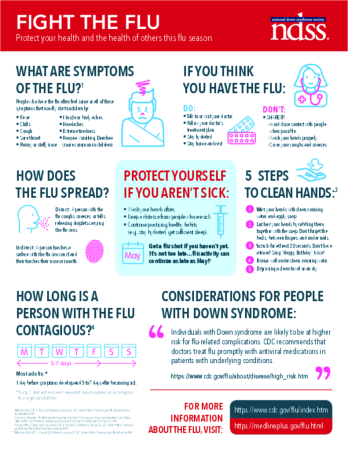
Influenza, commonly known as the “the flu,” is a respiratory illness caused by influenza viruses. People can experience mild to severe illness, and symptoms may include a fever, chills, cough, sore throat, runny or stuffy nose, headaches, extreme tiredness, muscle or aches, and nausea, vomiting, or diarrhea.1
Special Considerations for Individuals with Down syndrome when Considering How to Treat the Flu
Individuals with chronic medical conditions, including neurologic and cardiac conditions, are at increased risk for complications if they get sick with the flu.2 Studies have also shown that individuals with Down syndrome are likely to be at higher risk for flu-related complications.3 The Centers for Disease Control and Prevention (CDC) recommends that doctors treat flu illness promptly with antiviral medications in patients with underlying medical conditions.2 Antiviral medications can reduce the severity and duration of flu symptoms, and may reduce the risk of more serious flu-related complications. These medications work best when they are started early in the course of illness, so individuals with Down syndrome should contact their healthcare team immediately if they develop fever or other flu symptoms.
If symptoms are mild, stay home, rest, drink plenty of fluids, and treat other symptoms such as fever. If symptoms worsen, seek medical attention. You should also consult with a healthcare professional before taking any over the counter medications to help manage symptoms.4
If you or your loved one has the flu or flu-like symptoms, the CDC recommends waiting to go back to normal activities until:
- your symptoms are better overall
- you do not have a fever for at least 24 hours (without the use of fever reducing medications)5
For an additional five days, you should consider taking precautions such as practicing good hygiene, wearing a mask, and physical distancing. These precautions help prevent others from getting sick as well.
Protecting Against the Flu
The best protection against flu is to get a flu vaccine every year. Annual flu vaccination is recommended for everyone six months of age and older, with rare exceptions. Vaccination is especially important for those at increased risk of flu-related complications, including those with Down syndrome. It is also important that close contacts of high-risk individuals, including parents, siblings, household members, and caregivers, get vaccinated to avoid spreading the flu. Individuals should also follow everyday prevention measures to avoid contracting the flu, such as avoiding people who are sick, washing hands frequently with soap and water or alcohol-based hand sanitizer, avoiding touching their hands, eyes, nose, and mouth, and covering coughs and sneezes with a disposable tissue.
The information on this page is for informational purposes only. NDSS is not a healthcare provider, and this information should not be construed as medical advice or a substitute for professional guidance. Please consult with your or your family member’s qualified healthcare team or other trusted professionals to determine your/their personal health care and support needs (if any).








